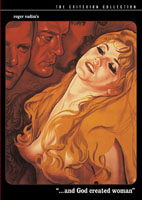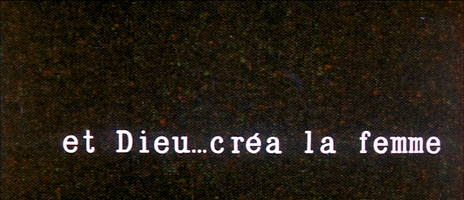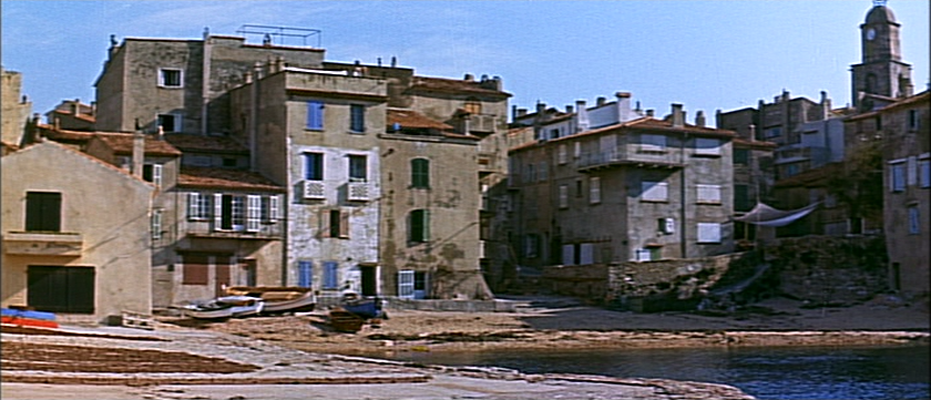directed by Roger Vadim
written by Roger Vadim and Raoul Lévy
2000: 

Criterion #77: And God Created Woman.
Or, going by the cover: “…and God created woman.”
Or, going by the French: and God… created woman.
This isn’t even a guilty pleasure.
Maybe it was just my mood but I couldn’t even enjoy looking at Brigitte Bardot, because that was so obviously the pitch. The movie was like an infomercial, paid product placement for her sex appeal. I get cynical when I’m advertised to.
This is a particular kind of junk that simply isn’t made anymore. Exploitation no longer feels the need for such a tedious display of manners.
There is a vast difference between a humanism that genuinely and unabashedly embraces sex, and a weaselly lasciviousness that is thrilled at the idea that couching itself as “humanism” will grant it legitimacy. This movie is like one of those courses for “pick-up artists” where a douche guru (like Tom Cruise in Magnolia) lets his dorky clients in on the secrets of feigning humanity at sex-master level: “Women have a psychological need to be listened to, so if you want to get in their pants you’re going to have to really listen to them, like, carefully.”
Roger Vadim seems to have been a lifelong pick-up humanist — whose proudest achievement was “winning” Brigitte Bardot, Catherine Deneuve, and Jane Fonda, among others — so I’m not sure how much he was able to be truly aware of the degree to which his moviemaking was empty exploitation, not actually thoughtful. He, like Hugh Hefner, seems to have lived refusing to concede that there was a difference. This movie sure seems to believe that it’s a real poem about people and life. That’s what makes it so worthless: it’s not even clear-headed and honest enough to offer up sex on a platter. It’s horny only in the smarmiest, most studied, most alienating way.
It’s “sex as life force” being sold in bad faith by someone who actually thinks of sex as a commodity. Like insincere copy in an ad for a luxury car: “The sexy new BMW is life itself.” Actually Bardot is the embodiment of insecurity about life itself, compensation.
There’s the very old pop-Freudian line about men with big houses, cars, cigars, whatever: “He must have a small penis.” But that line is a symptom of the same kind of pettiness. “He has a small faith,” is more like it. “He is afraid.”
This was a whole genre for a while: Rochelle Rochelle. Guys like Roger Vadim found that the pick-up artist playbook worked not just on hot 15-year-olds, but also on the entire U.S. audience, who were so naive that they couldn’t distinguish practiced smarm from genuine freedom of spirit. “The French are so romantic,” and so forth.
Actually, it’s a match made in heaven. After all, a sexually inhibited society like ours isn’t going to find anything appealing about actual disinhibition, which will seem tawdry and frightening and inadvisable. Only phony overcompensation concocted by the equally inhibited will have the right ring of sexy fantasy to it. Ooh la la: “Bardot stars as Juliette, an 18-year-old orphan whose unbridled appetite for pleasure shakes up all of St. Tropez.” Shake it up, baby! Rock that damn boat that we the audience are in; someone needs to. And it’s sure as hell not gonna be us.
So many of the online reviews of Vadim’s memoir begin: “Man, you have to envy Roger Vadim: Bardot, Deneuve, and Fonda!” I don’t know if you have to, but you’re certainly supposed to. Those reviewers are just playing along, following their cues, and the name of the game is so obviously envy.
The name of the movie is And God Created… My Girlfriend.
Well, he got exactly the envy he wanted: Brigitte Bardot became the sex symbol of the era. Which turned out to be a sex symbol for the ages, because the whole notion of “sex symbology” was specific to that moment in history. It’s a strangely apt term, “sex symbol,” when you think about it. You need a symbol to stand in for sex when the real thing is under lockdown. Which is why we don’t have “eating symbols” (Cookie Monster) or “sleep symbols” (Rip Van Winkle) — we just eat and sleep.
“Sex is a life force” yada yada yada, but the actual plot of the movie is of course about men and money, manly men trading in real estate, cars, and of course in the fate of the poor naked girl, with great manly-casual authority. Vadim couldn’t think of anything else, I guess. Here’s a snippet of the self-congratulatory dialogue, between older-but-wiser suitor #1 and hot-but-hotheaded suitor #2:
1: Does she cry?
2: Of course not.
1: Maybe she does when she’s alone.
2: She’s too much of a bitch for that.
1: When it comes to female psychology, my poor boy, you’re stuck in the Stone Age.
Whereas we and Roger Vadim are obviously well into the Bronze Age, so ha ha ha silly rabbit, you’ll never get the cars and St. Tropez real estate and SEX we’ve got coming to us.
She never bares her breasts to the camera, just to be clear. It’s 1956 after all. In the first 30 seconds you see her naked butt in a very carefully framed perfect profile, and that’s it for the peep show. Like I said, it’s not even forthright about the main attraction.
One thing I have not talked about is the actual Brigitte Bardot. Oh, like, the person? Who knows? She’s completely obscured behind all this wet T-shirt humanist schtick. Even in private, Vadim had been setting the rules for her performance of self-esteem since she was 15. Her role here is just his personal collection of deliciously coy things he’s seen girls do. But surely not Bardot herself. She’s clearly only going through the motions of being a free spirit, which is one of the most depressing possible displays. “I do work. I work at being happy,” she says, because it was written for her to say. This is the real fantasy: that she might have such poignant and summery philosophy in her heart… instead of whatever’s actually there. And Vadim has no compunction about contriving it and contriving for her to say it, as though that’s doing honor to her. How offensive.
Pornography would have been so much more respectful.
That this piece of Eastmancolor beach-blanket trash “revolutionized the foreign film market,” as Criterion puts it, is certainly interesting. In fact every aspect of it is interesting from a historical point of view. Understanding it historically means giving up on it as a movie — and it deserves that, I see now. But while I was watching it I wasn’t ready to give up, so I didn’t come to it in that frame of mind. And there’s no chance I’m going to watch it again.
Connection to the preceding movie: An unfulfilled woman’s fidelity is tested but she ultimately returns to her husband.
No significant bonus features.
I would love it if someone actually made a full-length Rochelle Rochelle — not as a string of lame Seinfeld references, but as an actual “strange erotic journey,” a full-fledged parody of the Euro-softcore artistically-justified-nudity arthouse-bait genre. That could be a funny movie even without the Seinfeld title, but the title is what’s going to land the pitch.
Music is by Paul Misraki (1908–1998), a French-Italian Jew from Turkey (last seen here scoring #25, Alphaville). There’s a lot of diegetic pop and jazz throughout, coming from the many record players and jukeboxes of St. Tropez, and I’m not sure if he wrote all of it — credit is also given to a musical director, Marc Lanjean. But Misraki certainly wrote our selection, the Main Titles. I have no complaints; for a movie like this, this is right on the money. As with Alphaville, Misraki comes out much better than the director. The album would be pretty good party music.
Isn’t it interesting that sex, which is the common property of absolutely every human being on earth, is constantly depicted as though it comes from the farthest orient? Or the primitive jungle? One way or another, it sure ain’t from here and now. Here and now we scoff at flesh; we wear suits. Taking them off is like falling into a storybook desert isle, traveling back to the days of the pharaohs or something. Listen to those congas!
On the other hand, maybe all life, even life in a suit, can take place on a storybook desert isle. Out of context, this music doesn’t have to be sex. It can just be happiness.
I like all the sounds in this kind of music, prior to assigning them meanings. And who needs to assign meaning? X out “Brigitte Bardot” in your mind and note that the track sounds equally like Donald Duck. Now X out “Donald Duck” too.

I read and appreciated very much. Thank you.